Shopping for an RV TV can be a daunting experience because there are so many things to take into consideration.
First, you need to figure out what type of television technology you want, what TV voltage you need, and how it will work best with your current camping setup.
The good news is that this guide has all the information and tips you need.
It’s best to read this post before making any purchases or decisions about installing TVs in your motorhome, travel trailer, fifth wheel camper, or campervan, as we’ve made sure to include all the information you need to help you decide.
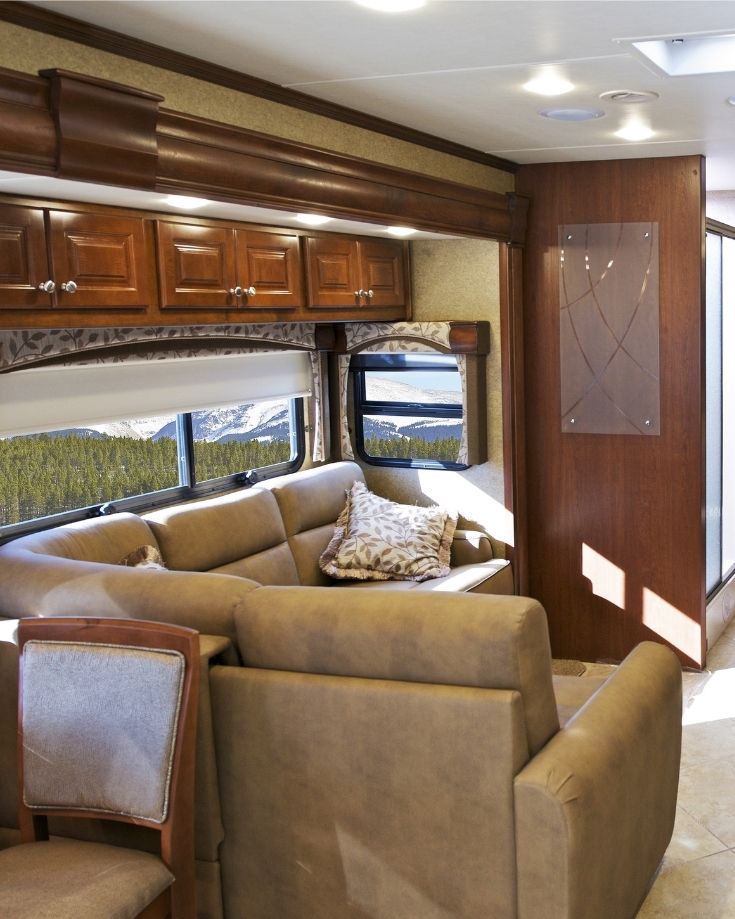
Do I Need An RV TV?
That depends on your needs and what you plan to use the RV for.
If you’re only going to be using it for weekend getaways or short trips, then there’s a good chance you won’t need one since you’ll most likely be enjoying the great outdoors and getting away from the trappings of modern-day life.
But if you’re planning on traveling long distances or spending extended periods in your RV, then a television can provide hours of entertainment and relaxation – especially during rainy days!
And if you’re living in your RV full-time, then the occasional binge on the latest Netflix box series is a little bit of luxury – take our word for it!
Many newer models of RV come with at least one flat-screen TV in-built. But if you’re buying an older model or converting a van into a camper, the chances are you’ll need to buy one.
Types of RV Televisions
The two main types of televisions popular for RVs are LCD and LED. Plasma TVs were once very popular but have been mostly phased out in recent years because they can be more power-hungry and tend to produce a warmer picture.
DLP (Digital Light Processing) TVs are similar to plasma TVs but use a different light source that results in better contrast ratios and black levels.
If you’re unsure about what type of TV would be best for your needs, continue reading…
LCD TVs
Many of today’s RVs come equipped with a built-in TV in the entertainment center or swivel arm. These have been designed to be compact and slim to easily fit into tight places between couches or beds while still providing excellent picture quality.
If you want something better than the factory model but don’t feel like installing a new wall mount, you might opt for an LCD TV instead.
This is one of the most common types of television technology used in RVs. They’re easy to install and don’t need additional parts such as a broadcast antenna – just plug them in with either a cable/satellite service, DVD, or an external media player.
They also come in a wide range of sizes, so you can find one that’s perfect for your needs.
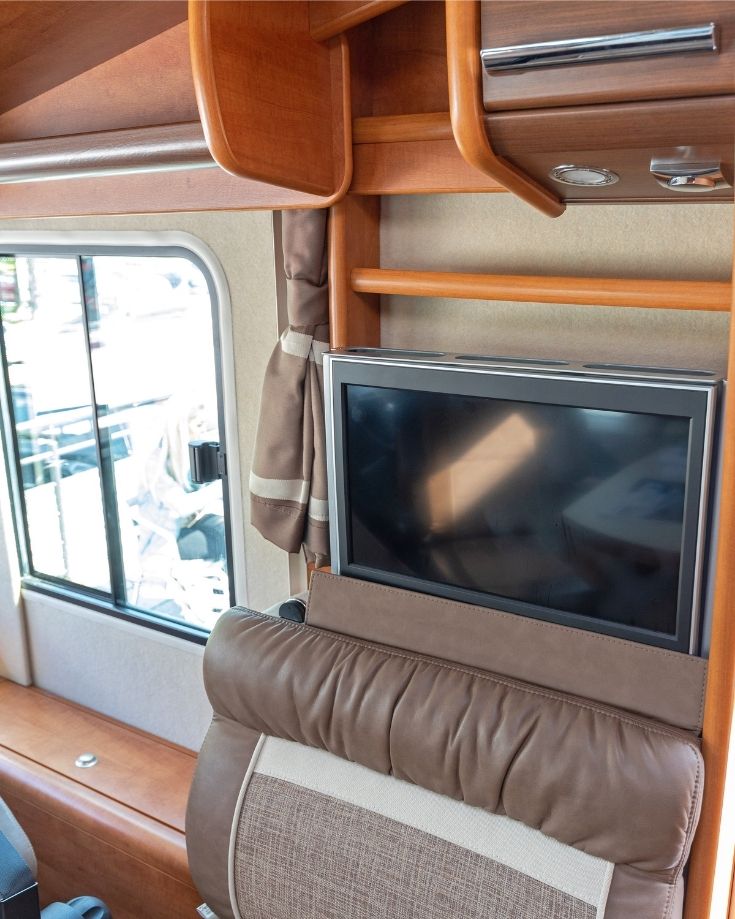
LED TVs
If you’re looking for an upgrade from the standard RV TV, then LED might be the way to go.
These televisions are typically more expensive than LCDs, but they have some advantages.
For example, they use less power and generate less heat than plasma or DLP TVs, making them a better choice if you’re concerned about conserving energy while camping.
In addition, their slim design means they can easily be mounted on walls or even ceilings without taking up too much space – great for small campervans or trailers.
Just like with LCDs, LED TVs usually come with built-in tuners that you can use to watch TV without needing any other equipment.
However, if you want better picture quality than an LCD or LED TV with a built-in tuner, then the only option is to add a broadcast antenna and receiver – which will require running cables through your RV.
Plasma TVs
Suppose space isn’t really much of a concern for you (we have RV envy right here!), and energy efficiency doesn’t matter. In that case, plasma televisions are usually regarded as having superior image qualities to their competitors.
This makes them great choices for movie buffs who love watching movies in their RVs on weekends because they deliver highly detailed pictures from all angles (unlike projection TVs) while also producing true blacks and a wide range of colors.
The only downside to plasma TVs is that they use more power than LCD or LED models and can get a bit hot. So if you’re looking for something with low energy demand, this might not be the best option.
Projection Televisions
As their name suggests, projection televisions work by projecting an image onto a larger screen rather than displaying it on the television itself.
This makes them perfect for RVs or campers as they don’t take up any extra space – all you need is an open wall on the inside or outside of your van or a screen to project onto.
However, remember that most projection TVs require two separate pieces: the screen and the projector itself. This means there can be more to set up, and you’ll need to install your own media player or streaming device.
RV Television Sizes
Just like with regular household televisions, there is a huge range of sizes and resolutions that RV TVs can come with.
Most TVs for RVs are either 19″ or 27″. Some smaller models, such as the 14″-17″ monitors, usually have built-in media players.
Meanwhile, 29″- 40″ televisions will often also feature high-definition tuners so you can watch HD channels on them if available in your area and have more versatile connections to external media players, too.
So Which Size TV Do You Need?
You should take a look at your space requirements, how much room you have in your RV, and the viewing angle. Also, think about what kind of media you’ll use. For example, if you have an extensive library of DVDs, choosing a model with the appropriate in-built media player or a smart TV may make more sense.
Otherwise, save some money by opting for something smaller with built-in streaming capabilities instead (if available).
How Do RV TVs Work?
TV signals are transmitted through the airwaves, so TV antennas pick up local TV channels.
However, sometimes there might be too many obstacles in between your RV and the broadcast signal – especially if it’s a long distance away or located on top of a building somewhere.
Many campgrounds around the US include a cable TV hookup point, ideal for times when you’re not boondocking or dry camping.
You may want to consider a satellite TV subscription for a more reliable TV connection.
Some RVs come with built-in satellite receivers, or you can install a satellite TV dish or dome antenna instead. Much like installing RV wifi antennas, this will probably involve fitting external mounts and running cables into the RV.

Can I Use A Regular TV In My Camper?
RV TVs work just like regular ones – they pick up the signal being sent through the airwaves and display whatever’s on them onto their screens, but there are a few things you need to make sure of.
So, can you use a regular TV in your camper? The answer is yes – but it may not be as simple as just plugging it in and turning it on. Take the following into account beforehand, and you’ll be able to make sure that your TV works properly:
- If using a 120 volt or 240 volt TV on your 12v electrical system, make sure your inverter is a pure sine wave model and sized correctly. You can read more about inverters here and use our inverter calculator to ensure it’s the correct size.
- Check your TV mount can support the weight of the TV before installation – do this no matter what type of TV you choose.
- You may need an adaptor to connect your regular TV to the RV antenna. If your TV doesn’t have a coaxial port, you’ll need an ATSC Tuner.
RV TVs Versus Regular TV’s
It might be worth considering whether or not you should buy a regular TV instead of one designed specifically for RVs.
The main difference is that RV televisions deal with more environmental factors. They’re usually installed in moving vehicles and exposed to different temperatures, moisture levels (cold and condensation), vibrations, and other physical conditions which wouldn’t typically affect regular TVs as much.
RV TV manufacturers, like Jensen, claim to have built their models with all that RV life can throw at them. But that promise comes at a price, and many RVers use regular TVs trouble-free.
As such, if you don’t plan on using your camper TV very often, then it’s probably better just getting a regular model from the get-go.
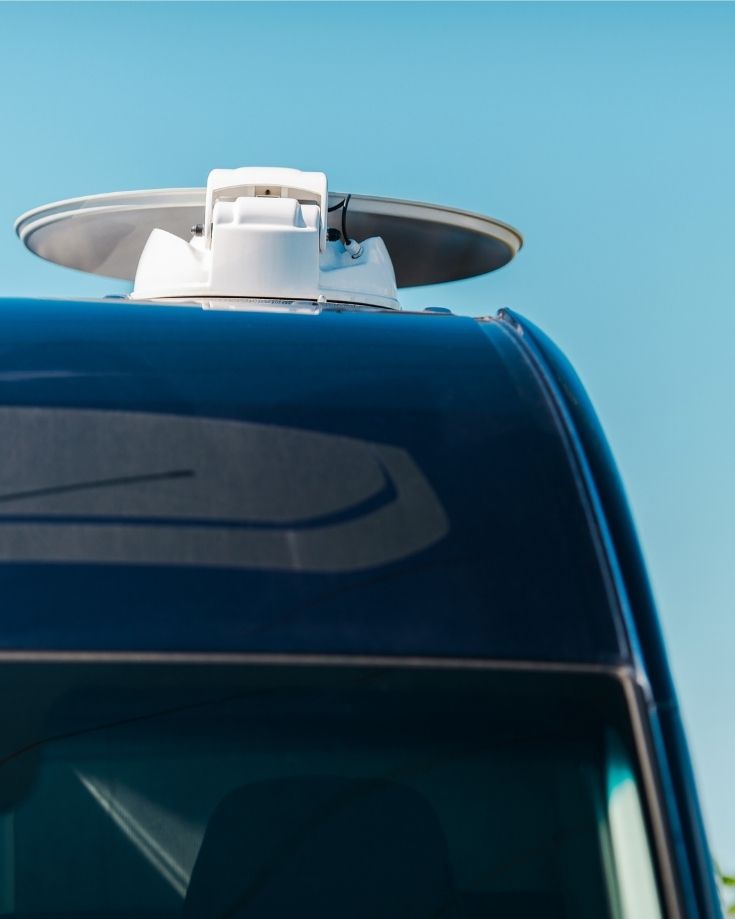
12-Volt Television Or 120-Volt Television?
This is a question you might have to ask yourself if you’re looking to buy a new RV TV.
12 volt TVs usually require a power inverter that converts direct current (DC) into alternating current (AC). In contrast, 120/240 volt TVs can run directly off the shore power without additional equipment.
The main benefit of choosing a 12 volt television is that it’ll use less energy, but there are some downsides too:
- Not all models are available in 12 volt versions, so make sure to double-check before buying;
- Screen sizes are often on the smaller size, so kiss goodbye to any chance of a widescreen cinema experience;
- If your battery isn’t fully charged, the picture might start cutting out or going completely black – this also happens when using an AC inverter with a 120/240-volt TV.
The main downside of choosing a 120 volt (or 240v) television is that it’ll use more energy, but there are some benefits too:
- You won’t need to buy any additional equipment for your RV;
- The picture will be crisper and clearer – especially if you hook up an HD box.
You can find out which one suits you best by considering the following things beforehand:
- How often/long do you plan on living in your RV?
- Do you expect to regularly use shore power hook up where you’re planning to stay most of the time?
- And finally, what size screen do you want?
Once all these questions have been answered, deciding whether to buy a 12-volt or 120/240-volt TV should be easier.
Best RV TV Brands To Look Out For
There are a few different TV brands popular in the RV world. Here is a list of some of the best ones:
- Jensen is a popular choice because they are durable and have various features.
- SuperSonic RV TVs are also very popular due to their low price point and good quality.
- VIZIO is a well-known brand for home TVs, so you know their RV models will be high quality.
What Kind of Accessories Do I Need For My RV TV?
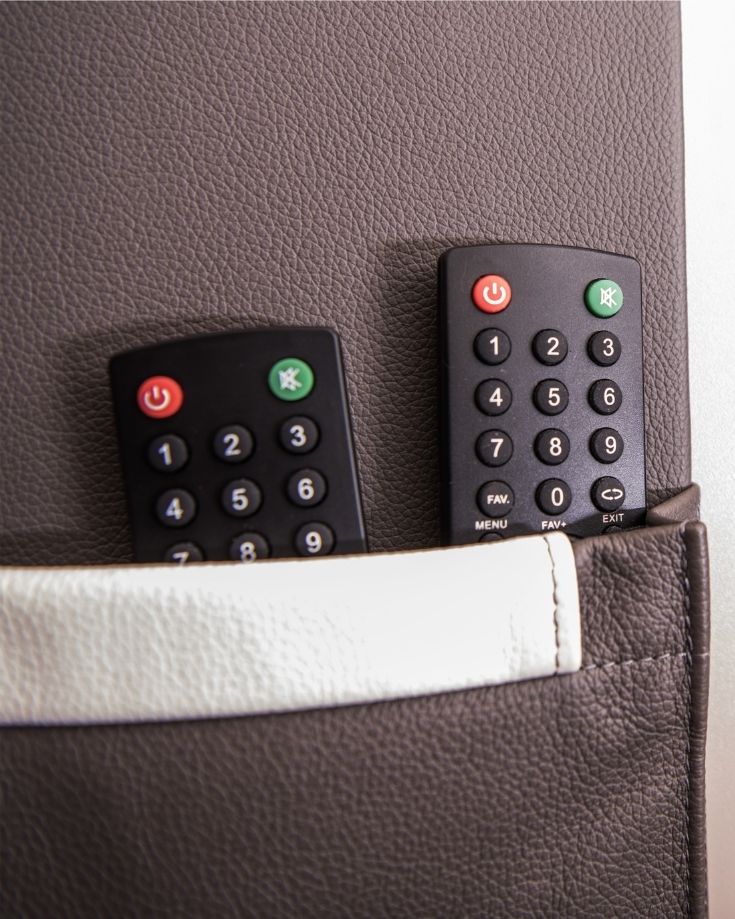
Assuming you’ve already got yourself a functional RV TV, here are some of the most common accessories:
TV Mounts
If you want to mount your TV somewhere (usually on the wall), then there are special brackets and mounts designed specifically for RV TVs that can be adjusted to fit any kind of display.
Remote Controls
These are important if you want to change the channel or volume without getting up from your seat – especially useful after a long day’s drive.
DVD Players
If you want access to other media playback options like DVDs or Blu-rays, then make sure they’re compatible with each other first before buying them together!
Surge Protectors/Power Strips
Necessary for anyone who wants extra protection against sudden power surges which could damage their RV TV. It might also be worth considering getting some GFCI protection power strips just to make sure you don’t overload your circuits.
Wrapping It Up
The type of television you choose will depend mostly on what features are important to you and how much extra space there is in your camper.
Some people love the crystal-clear image quality of LED TVs, while others prefer plasma because they use less power – so there is no right or wrong choice here. Just make sure to take a look at what kind of media you plan on using on your RV TV before making up your mind!
And that’s pretty much all you need to know about RV TVs! As you can see, there are a few things to consider before making your purchase, but hopefully, this guide has helped clear some of the fog.
Angela Devaney

Angela Devaney, a former IT project management professional, embarked on an adventurous journey of full-time travel, which included touring West Africa in a converted overland truck and converting an ex-military 4×4 Sprinter van into a camper for a five-year South American expedition. She now utilizes her hands-on experience to create practical RV living and van life advice as a full-time digital media producer, reaching over a million users annually through her YouTube channel, blog, and newsletter. Angela also lends her expertise as the editor-in-chief of the Campervan Electrics Handbook.


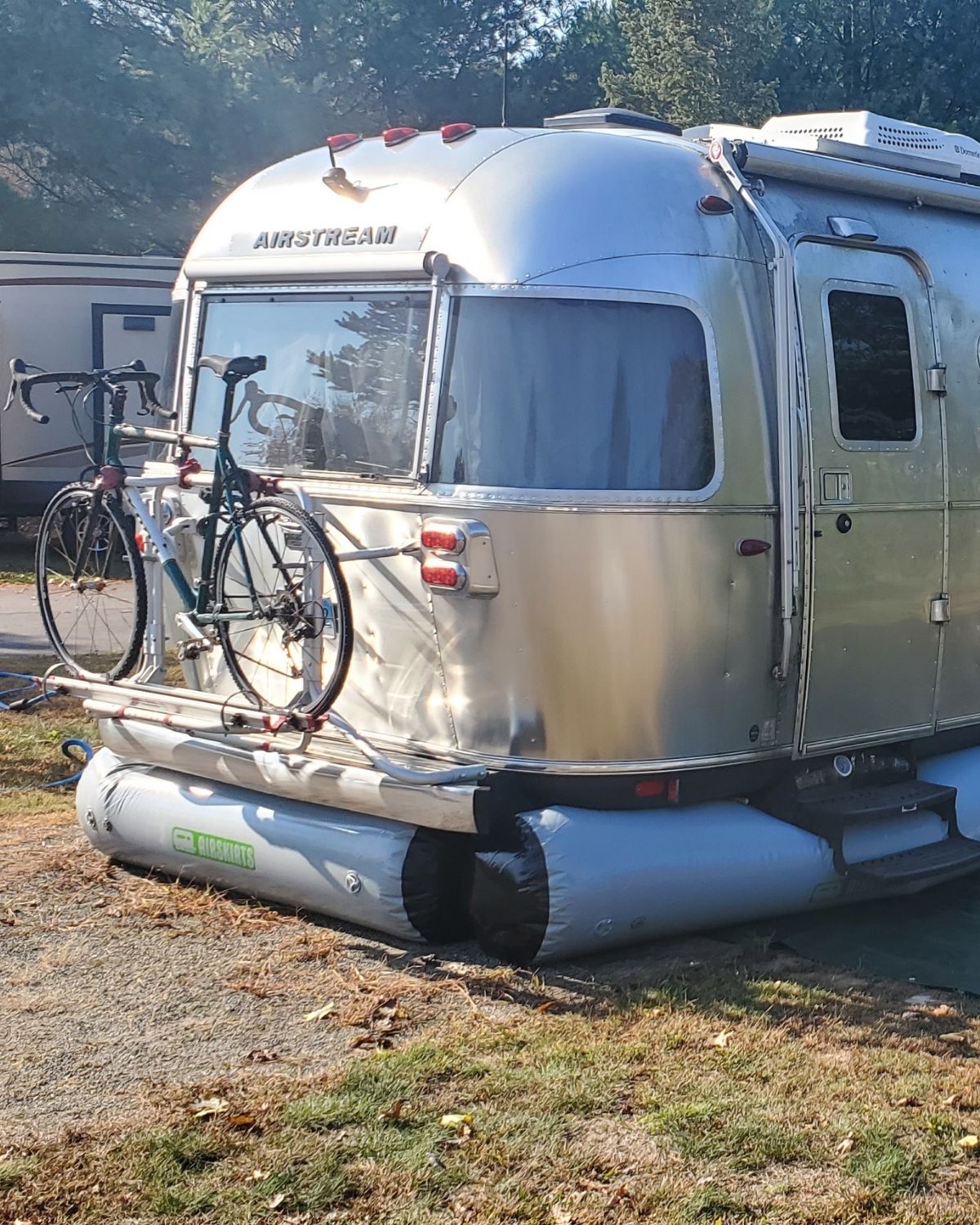

TV would be the last thing I want in a travel trailer or in a mobile home because I would be wasting my travel time if all I want to do is to watch TV on those rainy days.